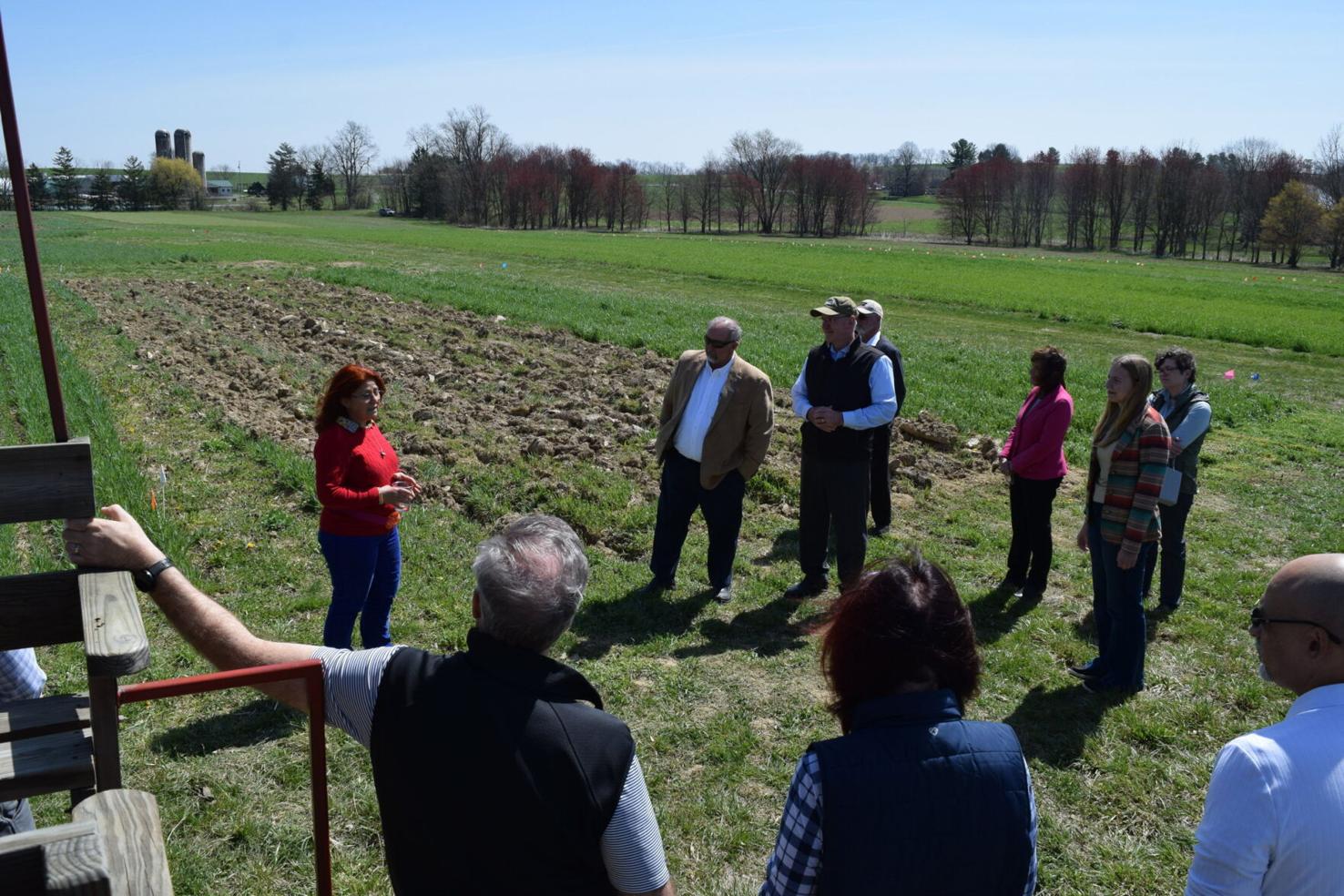
05 May Shapiro and Redding Set Goal to Make Pennsylvania the Nation’s Leader in Organic Farming
Reposted from Lancaster Farming – Apr 13, 2023
KUTZTOWN, Pa. — Gov. Josh Shapiro wants Pennsylvania to be the nation’s leader in organic farming.
That would mean tripling the state’s organic sales to keep pace with much bigger California.
Still, according to Ag Secretary Russell Redding, that’s not the idle dream of a suburban governor who calls himself “competitive as hell.”
Pennsylvania, currently third in organic sales, actually has the potential to leapfrog Washington and California within a few years, Redding said April 11 during a visit to the Rodale Institute with the House Agriculture and Rural Affairs Committee.
To put Pennsylvania on top, Shapiro has proposed $1 million in the state budget to create a Center for Organic Excellence. The state has similar centers supporting dairy, beef and poultry.
Pennsylvania’s projected path to pre-eminence is based on maintaining its organic sales gains of almost 50% since 2019.
Redding expects the state would do so by growing organic sectors where it already leads the nation — poultry and mushrooms.
The state grows most of the nation’s mushrooms, organic or otherwise, and producers have made strides toward organic management of the phorid fly, Redding said.
Pennsylvania gets almost 90% of its organic sales from livestock, poultry and eggs. But the poultry industry’s organic growth depends on the availability of organic grain, much of which comes from out of state.
In partnership with Cargill and Rodale, Fredericksburg-based Bell & Evans offers premiums to farmers during their three-year transition to organic. That’s a period when land must be managed organically but products don’t qualify for the organic seal.
Pennsylvania might be able to grow more organic grain, but getting high quality and yields could be tricky. Organic farmers have few tools for managing grain diseases.
“What we’ve experienced is the challenge of managing the grain within an environment of 41 inches of natural rain,” Redding said.
Though casual observers may still pigeonhole organic farming as small-scale produce growing, the sector is diverse in both commodities and scale. It adds up to a big industry in Pennsylvania, where almost two-thirds of the state’s organic operations gross at least $100,000 annually.
With $1 billion in annual organic sales, Pennsylvania has almost twice the sales of fourth-place Texas and is only narrowly behind No. 2 Washington, according to USDA.
Organics produce 9% of Pennsylvania farmgate revenue, compared to 2% nationally. The state’s organic sales are higher than for cattle, hogs or produce.
Shapiro’s effort to make Pennsylvania No. 1 in organic production continues a goal of his predecessor, fellow Democrat Tom Wolf.
Under Wolf, Redding launched the 2019 Pennsylvania Farm Bill, which benefited a variety of ag sectors.
It included expanded organic marketing opportunities, as well as free technical assistance for farmers interested in transitioning to organic through the Kutztown-based, internationally known Rodale Institute.
Raising Concerns
Regulated by USDA’s National Organic Program, organic farming emphasizes cultural and biological pest control, and limits the types of pesticides and fertilizers that farmers can use.
Though still a small part of the grocery market, organics have caught on with many consumers. Organic food sales have doubled in the past decade, according to the Organic Trade Association.
For farmers, organic’s appeal includes getting higher prices than conventional crops, participating in a growing market, and for some, farming in a manner that fits deeply held beliefs.
But organic production can entail higher costs than conventional and be complicated by the reduced set of crop protectants.
Organic farming often means tilling, which many Pennsylvania farmers have retreated from to reduce erosion.
And a 2015 review of 115 studies found organic yields average 19% less than conventional ag.
Rodale’s Farming Systems Trial, which has operated since 1981, has produced different results.
Organic may produce a yield drag in the first few years, but over the long term it produces yields comparable to conventional practices. In years with extreme conditions, organic can outperform conventional, said Jeff Tkach, incoming CEO of the Rodale Institute.
Rodale encourages farmers to manage a split operation, transitioning their acreage to organic incrementally.
“Don’t go zero to 100 miles an hour out of the gate. Let’s take a percentage of the farm, transition that successfully, and then go from there,” Tkach said.
Of the 3,200 acres under organic transition in Pennsylvania, 86% are on farms that already have some organic acreage, according to USDA.
While some farmers choose organic for reasons that are more economic than ideological, the system can still be an awkward subject with conventional farmers.
In 2019, some farmers and lawmakers questioned whether Wolf was trying to force organic practices on producers. Similar views have surfaced with Shapiro’s proposal.
During a March budget hearing, Rep. Eric Nelson, R-Westmoreland, described the clarification he wanted Redding to give conventional farmers.
“It’s almost more assurances that these existing producers and existing businesses are going to still be able to be enhanced and supported to grow and meet that existing need,” Nelson said. “Not that I’m against the organics.”
Redding told Nelson, and confirmed to Lancaster Farming this week, that the Shapiro administration isn’t trying to make all farmers go organic. Rather, it wants to bolster a major ag sector and assist those who decide organic is right for all or a part of their farm.
“At the end of all of that consideration, it is still a personal decision. It’s a voluntary decision,” Redding said.
Taking the Crown
When the Pennsylvania Farm Bill was created, Redding considered including a state-level program to oversee organic regulations using delegated authority from the federal government. California is the only state with such a program.
At the time, Redding was concerned that USDA was falling short in protecting the integrity of organic certification. Grain imports from Eastern Europe were under scrutiny for widespread mislabeling.
USDA announced tightened import rules in January, satisfying Redding’s concerns for the time being.
For the new state initiative, Redding decided the money could be better spent helping farmers transition to organic and providing them with quality assurance testing.
The state’s food safety lab could address consumer complaints, provide verification to buyers that a farm’s products meet organic standards, and help farmers check their own products, he said.
If all goes to plan, Redding said Pennsylvania could become the top organic producer within a few years.
The state has 1,125 organic farms, behind only California, Wisconsin and New York.
But the lucrative, fast-growing organic market is competitive. Beating California and its $3.6 billion organic sales is far from a given.
Compared to Pennsylvania, the Golden State has more than double the number of organic farms, nearly eight times the organic acreage, and 10 times the acres in transition. (Fortunately for Pennsylvania, poultry and mushroom houses can produce a lot of revenue on a modest footprint.)
Between 2016 and 2019, Washington edged past Pennsylvania for second place in organic sales.
The state also needs increased organic processing capacity for both crops and livestock, and a steady flow of organic grain from somewhere to feed poultry.
A Center for Organic Excellence might help meet those challenges.
“What do we need to do to keep the momentum?” Redding said. “We’re not going to stay in this work simply by being good people. We are, but there’s so many other things we have to do to get out front.”


No Comments